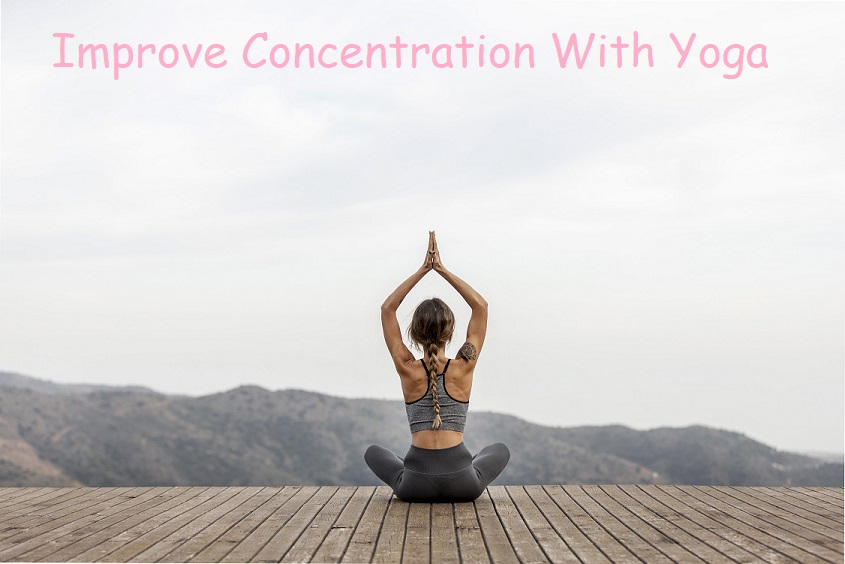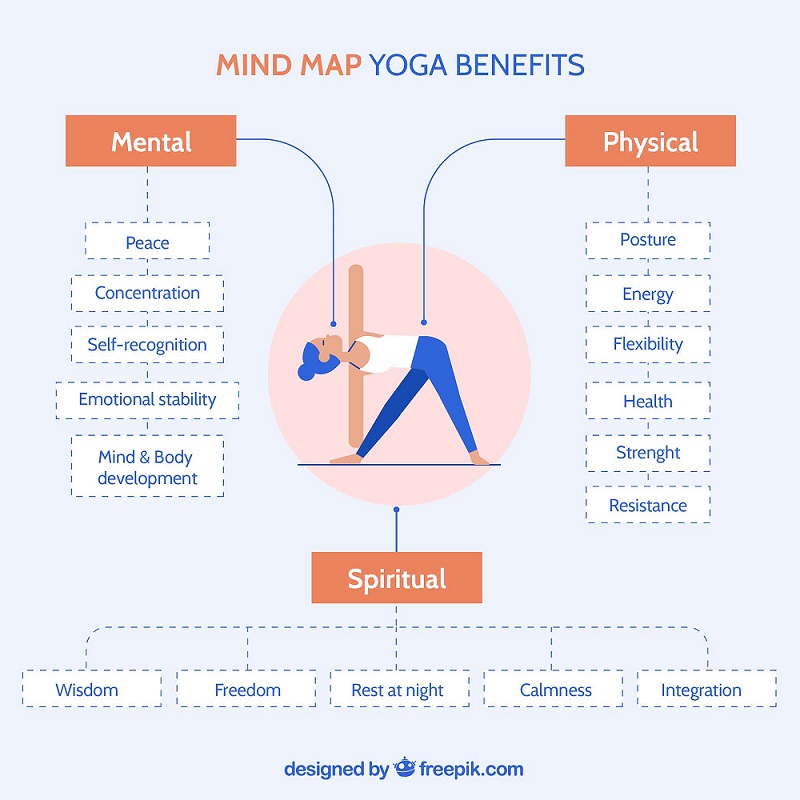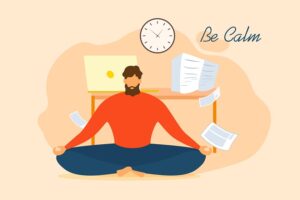How Can Yoga Improve Concentration?
Yoga is an ancient art form that has many well-known health benefits. Likewise, is used often as a relaxation technique. In fact, if you practice yoga daily, you can potentially see drastic changes in both your mind and body. There are many ways you can improve your life, with yoga. Individuals even take on yoga to help increase or improve their concentration levels. So, can this be true? Can yoga improve concentration?

In our busy and hectic world, it can be difficult sometimes to concentrate on the things that are actually important. Surely, distractions are everywhere! Whether that be family, work, or school. Yoga, along with other mindfulness practices, have been known to boost mood and help with concentration. As such, concentration is a key component in yoga itself.
However, isn’t yoga only for fitness enthusiasts? No! In fact, even a complete beginner to the practice can participate and perform certain yoga asanas, with a basic fundamental understanding. As you become better with basic physical postures, you will be able to advance to more technical ones (if you so choose), like aerial yoga. Even using basic yoga props can help in the beginning stages.
In this post, we’ll go over how yoga can be done “correctly”. Furthermore, how when done thoughtfully the potential impact yoga can have on concentration.
How Can Yoga be Performed Correctly?

To discuss yoga and concentration specifically, we should cover a few areas first, including:
- How yoga can be performed “correctly”, to start to see advancements in body and mind?
- What is yoga?
- Why is yoga right for me? Can yoga help with stress?
Oftentimes, these are questions we get from all beginner yogis. Many mistakenly believe yoga is all about increasing levels of flexibility, and movement. Yet, it’s far more. Yoga is not always about trying to push your body to the limit. Oftentimes, it’s about finding a sense of inner peace combined with improving the physical self.
Surely, at some point on the yoga mat, you’ll want to challenge yourself with difficult poses. Above all, correctly practiced yoga needs to bring balance, stability, and attention to both the body and mind.
Related Article: Finding Balance: 5 Yoga Poses for Stability and Grounding
Being Prepared & Having Goals!
Oftentimes, you’ll want to begin with an intention. Want do you want to accomplish with each yoga session. What is your end goal. Additionally, noting that different styles of yoga, can yield different results.
It’s helpful to get a sense of the more popular styles, and what they offer. What are some of the basic poses within a particular style. What is the pace of a session? Are you looking to get your heart rate up, like in a Vinyasa Flow class, or do you prefer a slower more restorative style course of action?
Understanding the basics of a particular style, can bode well for you both from a physical and mental state. Kind of like a practice test. Get used to what to expect. If completely unprepared, you may be more prone to become discouraged, which is not the point of yoga.
For many, engaging in a beginner classes is the way to go. Alternatively, participate in a video demonstration from a reliable trainer. Even doing simple poses and beginner routines can increase your level of concentration. Don’t be ashamed to start off with beginner asanas, and work slowly and patiently. Furthermore, you’ll want to develop a good base understanding of poses. Sort of like, building blocks.
Focus on your breathing. Breathing is a vital part of doing yoga properly. You’ll want to stay strong and stable in your poses, while breathing rhythmically and purposefully. Focusing on simple breathing patterns, can help you sink deeper into your pose(s) and with reaching a level of inner peace more effectively. It helps hone in on your concentration skills, specifically.

What are the Benefits of Doing Yoga Correctly?
This is the ultimate goal right? Have a better understanding of the practice. Start slowly. Learn the poses so that you can effectively and safely perform them. Then, continue to master your mind-body connection. Above all, working toward a goal or end goal(s).
A sound yoga technique will prevent you from getting injured and put you on a clear path to success, both short and long term.
When you take the time to practice yoga with intention and preparation, you’ll reach your goals faster. As your preparation improves, so will your sessions, leading to better mental focus, concentration, flexibility, muscle endurance, muscle strength and mind-body cohesion.
Can Yoga Improve Concentration: Increase Concentration?
Doing yoga to improve your concentration levels can be extremely effective. There are a number of ways that yoga, performed the right way, may increase your attention span, focus, and your concentration abilities.
I. To Reroute Your Attention:

Some studies have suggested yoga helps individuals with better focus. Part of this may have to do with how yoga reroutes the mind’s attention. As you perform, your attention is brought solely to the body and mind, breathing techniques, and specific asanas.
In fact, one such review of literature published in 2019, states that there is promising early evidence that yoga, positively impacts brain health. Furthermore, yoga “may hold promise to mitigate age-related decline”, from a neurological standpoint.
The act of bending and holding yoga poses, keeps the mind completely focused and settled in the moment. This doesn’t mean your mind may not occasionally wonder. However, if occurring frequently this may indicate a need to change your routine, maneuvers, props, to challenge yourself more.
The thought is that overtime you train your mind to focus better on specific tasks, both in your yoga routine, and outside of your sessions.
Simultaneously, potentially helping in other areas of your life. For example, sleep issues at bedtime, or generally helping people cope with stressful events more effectively.
II. Potentially Improving the Flow of Oxygen, Blood Circulation and the Release of Endorphins in Your Body:

Here we focus on the benefits of yoga for the body. Your body may benefit both short and long term. Not only with acute bouts of increased energy, but even with endurance, flexibility, and helping avoid injuries as we age.
Yoga helps, like with many physical exercises or training programs, to open up the lungs and deliver nutrient rich oxygen more efficiently to the body. This is done through breathing techniques. Some yoga styles can even be placed alongside a more moderate to vigorous class of exercise. Meaning, the heart rate resides in the fat burn or cardio burn-zone. Long term, this can help with better oxygen, and or circulation throughout the body. Specifically, potentially better cardio-respiratory health.
Exercise forms like yoga, leads to the release of neurotransmitters, called endorphins (or “happy hormones”). These are your feel good neurotransmitters during and after exercise. Oftentimes, continually released, for up to 30-minutes post workout.
III. Reduces Stress and Fatigue:

Yoga can potentially improve concentration in other ways, too. Yoga is thought to help with decreasing stress, helping to deal with stressful situations more effectively.
Exercise in general, has been proven to help lower blood pressure. Yoga, being both a mind-body workout may help to improve areas of health from a physiological and psychological perspective. When you are not in a stressed-out state, your mind enters a more tranquil state, which allows you to relax and concentrate better.
In addition, with less stress, there is less strain on the body and mind. Thus, potentially helping free up your mind, allowing you to feel more energetic and focused throughout your day. Overall, with more energy gained from regular yoga practice, should have you feeling more prepared for the day, and less fatigued.
One study from the International Journal of Yoga 2011, concluded that yoga helps to decrease stress, anxiety, depression, and things such as chronic pain and overall well-being in life!
IV. Reduces Anxiety and Negative Emotions:

As beforementioned, yoga can help with stress load and management. However, it can also influence the reduction of anxiety and negative emotions. In fact, like regular exercise, doing yoga alongside professional treatment options is something that can help with symptoms of anxiety. This is because yoga has such a powerful impact on the mind.
This can seem unrelated to the ability to concentrate, however, when you’re highly anxious along with other thoughts racing, it makes it harder to focus on what’s truly important or other positive emotions. As you become stronger mentally and physically while practicing yoga, yoga can be tied to the ability to increase your concentration and focus on your current sessions and routine preparation.
This mental clarity will hopefully make it easier to focus on things that can be beneficial to your well-being or your families well-being.
Final Thoughts!
Overall, when yoga is done correctly, yoga can contribute to your life is a huge way! Whether physically, or mentally, yoga can touch you personally. Above all, leading to better health, a better ability to focus and concentrate on the positive things in your life. Consequently, an easier time handling the more difficult ones.
Don’t rush into your practice. Educate yourself about the practice first. Know where your are physically, and what your end goal(s) are.
Please be sure to share your experiences, and what yoga has done for your life on our blog and in the comments section!
Resources:
- https://universityhealthnews.com/daily/mobility-fitness/yoga-for-concentration-cognition-and-memory/
- https://www.cbsnews.com/news/yoga-may-improve-focus-ability-to-remember-new-things/
- https://www.magneticmemorymethod.com/yoga-for-concentration-and-memory/
- https://www.ncbi.nlm.nih.gov/pmc/articles/PMC6971819/
- https://www.ncbi.nlm.nih.gov/pmc/articles/PMC3193654/




